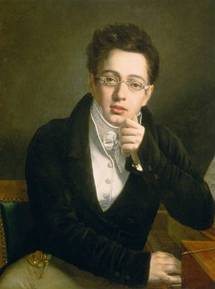
 CHUBERT was an extraordinary composer, not only for the beauty of his music, but also for the sheer magnitude of his corpus. Once a chorister in the Vienna Boys Choir, Schubert went on to compose more than 1500 works—and he died at age 31! These works span many genres, including Masses, symphonies, operas, chamber works, and overtures.
CHUBERT was an extraordinary composer, not only for the beauty of his music, but also for the sheer magnitude of his corpus. Once a chorister in the Vienna Boys Choir, Schubert went on to compose more than 1500 works—and he died at age 31! These works span many genres, including Masses, symphonies, operas, chamber works, and overtures.
His largest group of works, of which he left us roughly 600 examples, is the category of Lieder, sometimes called art songs. These pieces, scored for piano and solo voice, set German-language poems to classical art music.
Recently, I heard a performance of several Schubert Lieder. Among them were several charming pieces, but one stood out for the beauty of its text. Entitled An die Musik (“To Music”), the text was written by Franz von Schober, a friend and roommate of Schubert. The composer set the poem to music in 1817, having barely entered his twenties.
The text of the piece is as follows:
Du holde Kunst, in wie viel grauen Stunden,
Wo mich das Lebens wilder Kreis umstrickt,
Hast du mein Herz zu warmer Lieb entzunden,
Hast mich in eine beßre Welt entrückt.Oft hat ein Seufzer, deiner Harf entfloßen,
Ein süßer, heiliger Akkord von dir,
Den Himmel beßre Zeiten mir erschloßen,
Du holde Kunst, ich danke dir dafür.
An English translation:
Thou, lovely art, in how many gray hours
in which I have been ensnared by life’s wild circle,
hast thou inflamed my heart to warm love,
hast thou transported me to a better world?Often has a sigh, flowing from your harp—
a sweet, holy chord from thee—
unlocked for me the heaven of better times.
Thou, lovely art, I thank thee for it!


 HIS CHARMING art song, both in its melody and in its message, reminds us of the medicinal quality of music, which can provide a welcome salve in trying times.
HIS CHARMING art song, both in its melody and in its message, reminds us of the medicinal quality of music, which can provide a welcome salve in trying times.
Music, for most of our readers, is either a dear avocation or a full profession. It is good to be reminded, therefore, that music has the power to lead us on toward heaven.
